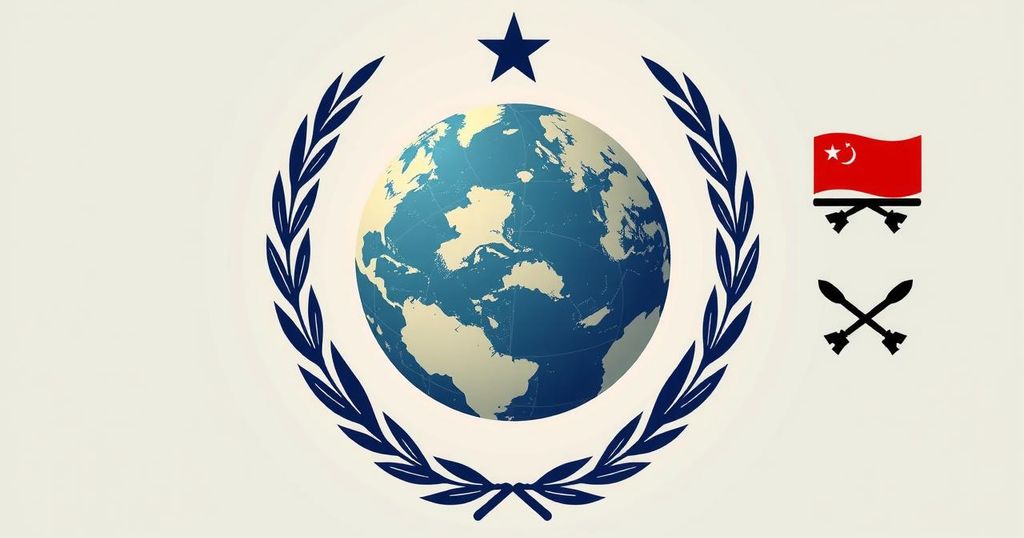Aidarus al-Zoubaidi of Yemen’s UN-backed government urged Western nations to exploit Iran’s weaknesses to target the Houthis. He called for military cooperation and criticized the past ineffective U.S. strikes. Zoubaidi also stressed the need for a redesignation of the Houthis as terrorists, reflecting a move away from diplomacy toward military action.
Aidarus al-Zoubaidi, the vice-president of Yemen’s UN-backed government, has urged Western nations to target the Iran-supported Houthi leadership in Yemen due to Iran’s current vulnerabilities in the Middle East. Speaking from the World Economic Forum in Davos, he highlighted that Iran’s setbacks in Lebanon, Syria, and Gaza leave Yemen as its last significant influence. Zoubaidi called for Western military cooperation to effectively counter the Houthis through coordinated ground operations and airstrikes.
Furthermore, Zoubaidi emphasized the necessity for the new U.S. administration to classify the Houthis as a foreign terrorist organization, commending former President Donald Trump’s leadership in this context. He articulated the perspective of the Presidential Leadership Council in Aden as one that sees the weakening of Iran, combined with a possible return of Trump, as an opening for a comprehensive military strategy against Houthi forces, potentially employing ground troops.
Zoubaidi expressed skepticism about Iran’s willingness to relinquish support for the Houthis, predicting that Iran will intensify its assistance as the Houthis are critical to its proxy strategies. He remarked, “Iran will not give up on the Houthis, but on the contrary double down on its support for the Houthis as the last remaining component of its chain of proxy forces.”
In addition, Zoubaidi mentioned the Aden government’s readiness to share intelligence in support of operations against the Houthis, indicating a willingness to collaborate even with Israeli forces. However, he criticized past U.S. military actions against the Houthis as ineffective, stating they failed to target key leadership and lacked a comprehensive strategy that would include ground operations alongside airstrikes.
Currently, U.S. strikes have aimed to deter the Houthis from targeting commercial shipping in the Red Sea. Nonetheless, the Houthis announced their intention to limit attacks to ships directly associated with Israel. The remarks from Houthi leader Abdul-Malik al-Houthi suggest a shift in focus towards specific strategic targets.
Zoubaidi also asserted that the support base for the Houthis differs distinctly from groups like Hezbollah and Hamas, implying that targeting their leadership alone would not suffice to diminish their influence. He criticized the Biden administration for its less aggressive stance, attributing the Houthis’ growing operational freedom to the decision to downgrade their classification as a terrorist organization.
Overall, Zoubaidi’s statements reflect a departure from previously favored diplomatic resolutions, signaling a prevailing sentiment that an aggressive military approach may now be necessary. The support for this strategy from regional allies like Saudi Arabia and the UAE remains uncertain.
The ongoing conflict in Yemen has been significantly influenced by external powers, particularly Iran and Saudi Arabia, who back opposing factions. The Houthis, a group supported by Iran, have controlled significant parts of Yemen, including the capital, Sana’a, since 2014. With Iran facing challenges in other regions, the Yemeni leadership sees an opportunity to reduce the influence of the Houthis. The dynamics of the U.S. foreign policy and regional alliances play a crucial role in shaping the future of this conflict.
In summary, Aidarus al-Zoubaidi has called for coordinated military efforts from Western nations to counter the Iran-backed Houthi forces in Yemen while Iran is perceived as weakened. He supports aggressive measures, including ground operations and the designation of the Houthis as terrorists, reflecting a broader strategy potentially aligning with previous U.S. administration policies. This shift suggests diminishing hopes in diplomatic solutions toward a more military-focused approach in Yemen.
Original Source: www.theguardian.com






